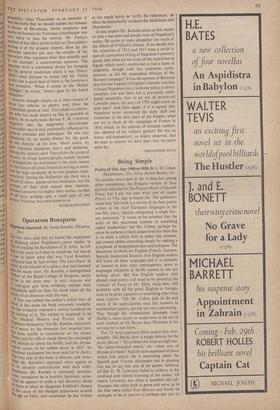Operation Bonaparte
Napoleon Immortal. By James Kemble. (Murray, 28s.) GotA tiE once said that he found the experience clf thinking about Napoleon's career similar to that of reading the Revelation of St. John : he felt ,litere was more in it than he could see, but was at loss to know what that was. Lord Rosebery ee'nfessed that he had written 'The Last Phase' in hue,der to rid himself of a subject that had haunted 1111 for many years. Mr. Kemble, a distinguished , elt°w of the Royal College of Surgeons, seems :0 be in the same case : le petit chapeau and fle redingote gris have evidently exerted their lInidable spell on him; his book bears all the 'narks of an obsession with 'the man.'
If this was indeed the author's initial 'state of
it has made his book extremely readable, t,tit. has evidently imposed a serious handicap on luei, Writing of it. The subject is supposed to be ki 'le 'Medical History and Private Life of :`aPoleon Bonaparte,' but Mr. Kemble, distracted, r it seems, by the obsession that impelled him, ;11.s been unable to concentrate on his chosen a„e,tne, and he tells as much about his campaigns '1u Policies as about his health, and the physio- icbgical causes of his sudden decay in 1815. An ,;,Ifectious excitement has been paid for in clarity. rise very title of the book is obscure, and some- 131fles Mr. Kemble's expressed views appear to in absolute contradiction with each other. e"Netimes Mr. Kemble is extremely perspica- 1:°1.1s; sometimes he is horribly facetious; some- is'tises he appears to make a real discovery about hero as when he diagnoses Frohlich's disease tls the cause of his changed appearance around Ile age of forty; and sometimes he has written in too much hurry to 'verify his references,' as when he fantastically misdates the Madeleine and Meisonnier.
In one respect Mr. Kemble seems to this reader to take a too neat and simple view of Napoleon's career. He seems to make altogether too much of the effects of Frohlich's disease. If we decide that the calamities of 1812 and 1813 were a result in part of a premature failing of Napoleon's pituitary gland, then what are we to say of the expedition to Egypt, which surely manifested as bad a lapse of judgment, though with less enormous conse- quences, as did the stupendous blunder of the Russian campaign? It was the opinion of Rdinusat that the real tragedy of Enghien's murder was that it forced Napoleon into a bellicose policy to divert attention; but was there not a previously estab- lished possibility that in an era of protracted Consular peace, the story of 1799 might catch up with him? And then again, if it is agreed that Napoleon never recovered the dash, skill and resolution of the first years of the Empire. what are we to think of the campaign of France in 1814, which, in the opinion of eminent authori- ties, showed all his military genius? He was so direct, self-explanatory, so widely observed, that we tend to assume we have him—but we never quite do.
CHRISTOPHER SYKES






































 Previous page
Previous page